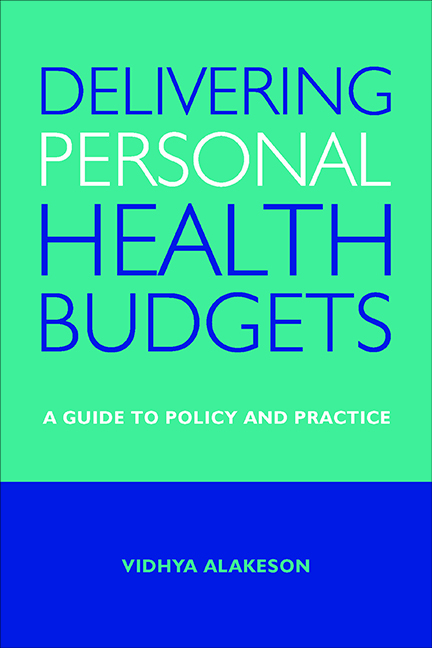Book contents
- Frontmatter
- Contents
- List of tables and figures
- Acknowledgements
- Prologue: Stephen’s story
- Introduction
- Section 1 Introducing personal health budgets
- Section 2 Implementing personal health budgets
- Section 3 Personal health budgets and organisational change in the NHS
- Conclusion
- Epilogue: Jonathan’s story
- References
- Index
eight - Getting the most out of care planning
Published online by Cambridge University Press: 03 February 2022
- Frontmatter
- Contents
- List of tables and figures
- Acknowledgements
- Prologue: Stephen’s story
- Introduction
- Section 1 Introducing personal health budgets
- Section 2 Implementing personal health budgets
- Section 3 Personal health budgets and organisational change in the NHS
- Conclusion
- Epilogue: Jonathan’s story
- References
- Index
Summary
Care planning is intended to form a central part of the management of long-term conditions in the NHS, and the majority of people with a long-term condition report having a care planning discussion with their health professional (Singh and Ham, 2006). However, it is still the case that care planning is largely professionally driven. Professionals often start mentally slotting individuals into available services based on the written results of an assessment before even meeting or talking to the individual in question. Professionals only have so many service options to work with, and individuals have to fit into one. The flexibility of a PHB means that individuals do not have to slot in where they do not quite fit. It is possible to really individualise the care planning process to include tailor-made goals and choices.
The care planning process for PHBs is driven by the individual, and the plan can take whatever form the individual chooses and is written in the individual's own words. That said, individuals who are in receipt of a PHB can have significant health problems that need to be well managed as an integral part of them enjoying a good life. Access to clinical knowledge and advice remains important. However, individual choices and preferences need to be factored into the way in which clinical care is delivered and who delivers it.
The common failure to take medication as prescribed often stems from the negative effects of prescribed medicine on facets of life that individuals consider important, such as their role as a parent or employee. These activities have been described as ‘personal medicine’ – the everyday activities that can be a source of motivation and have significant therapeutic value. A conflict between professionally recommended treatment and ‘personal medicine’ arises when medical professionals fail to consider the preferences and life circumstances of individuals when planning care (Deegan, 2005). In working with individuals and families, clinicians need to acknowledge and respect their expertise and work with them to make a reality of their choices rather than dismissing alternatives as too risky and not clinically proven.
- Type
- Chapter
- Information
- Delivering Personal Health BudgetsA Guide to Policy and Practice, pp. 91 - 100Publisher: Bristol University PressPrint publication year: 2014



